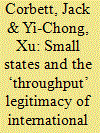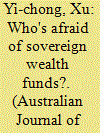| Srl | Item |
| 1 |
ID:
145794


|
|
|
|
|
| Summary/Abstract |
The Standing Committee of the State Council (SCSC) is the principal government institution in China and is often referred to as the “Chinese Cabinet.” This article seeks to explain how the SCSC fulfills two functions that are required in all government executives: coordination and the resolution of disputes. It describes the membership of the SCSC, its supporting structures and its working practices, and identifies the alternative strategies available to the premier. The article challenges two popular accounts of the State Council that underplay its role in Chinese politics by either attributing all authority up to the Politburo of the Chinese Communist Party or downward to the bureaucracies. The article concludes by suggesting a series of nuanced roles that the SCSC plays as it seeks to meet those key challenges of governing that, regardless of regime, all executive governments must face.
|
|
|
|
|
|
|
|
|
|
|
|
|
|
|
|
| 2 |
ID:
080925


|
|
|
|
|
| Publication |
2008.
|
| Summary/Abstract |
China and the US are two key players in the recent round of 'scrambling' for Africa. They compete for control over oil and other strategic resources, for markets, and for political influence. Their competition has alarmed many. This study tests the alarmist interpretations by identifying what the US and China are actually doing and to how they perceive each other's activities. Their ambitions are often considered in isolation. When laid out side by side, the extent to which their activities in Africa may overlap or clash can be seen more clearly. China and the US are seeking different things at different places in the continent and are careful not to upset one another. Their activities do not support the dire prediction. The 'scramble for Africa' may irritate; it is unlikely to cause direct confrontations because competition remains by and large economic and economic competition in an integrated global economy creates networks of constraints that ameliorate potential confrontation
|
|
|
|
|
|
|
|
|
|
|
|
|
|
|
|
| 3 |
ID:
069704


|
|
|
| 4 |
ID:
108060


|
|
|
|
|
| Publication |
New York, Palgrave Macmillan, 2011.
|
| Description |
xiii, 246p.
|
| Series |
Energy , climate and the environment series
|
| Standard Number |
9780230240247, hbk
|
|
|
|
|
|
|
|
|
|
|
|
Copies: C:1/I:0,R:0,Q:0
Circulation
| Accession# | Call# | Current Location | Status | Policy | Location |
| 056319 | 333.7924095/YIC 056319 | Main | On Shelf | General | |
|
|
|
|
| 5 |
ID:
164354


|
|
|
|
|
| Summary/Abstract |
The unequal participation of member states in international organizations (IOs) undermines IOs’ legitimacy as global actors. Existing scholarship typically makes this assessment by referencing a combination of input—the interests IOs serve—and output—the decisions they take. This scholarship does not, however, pay enough attention to how IOs have responded to these concerns. We argue that IOs have used the participation of small states—whose membership most studies typically ignore—as an important means of generating what Vivian Schmidt calls ‘throughput’ legitimacy for their operations. We organize our analysis of ‘throughput’ legitimacy in IOs around four institutional mechanisms—(1) agenda setting; (2) leadership (s)election; (3) management and operation; and (4) service delivery—in which all states seek to exert influence. What emerges is an account of IOs seeking to balance ‘inputs’ and ‘outputs’ by way of ‘throughputs’. We conclude by arguing for an expanded focus on the means by which IOs generate ‘throughput’ legitimacy in future research.
|
|
|
|
|
|
|
|
|
|
|
|
|
|
|
|
| 6 |
ID:
086570


|
|
|
|
|
| Publication |
2009.
|
| Summary/Abstract |
A spectre is stalking the world: the spectre of a rich Chinese state buying strategic resources, hollowing out companies, gobbling up financial institutions and threatening the sovereignty of the countries in whose resources and companies it invests. The China Investment Corporation (CIC) - a sovereign wealth fund company (SWF) - is the stalking horse of the Chinese state. Using the CIC as an example, this article argues that the warning about SWFs has little to do with their size, the speed of their growth or what SWFs have or have not done. It is about a shifting power relationship in the global economy. This broader realignment may have been occurring slowly, but it is happening. Neither side - those who have been writing the rules of the game for international political economy and those who are historically rule-takers - is fully willing to acknowledge the shift and take responsibility to build a new architecture of an international financial system that can accommodate interests of old and new players.
|
|
|
|
|
|
|
|
|
|
|
|
|
|
|
|